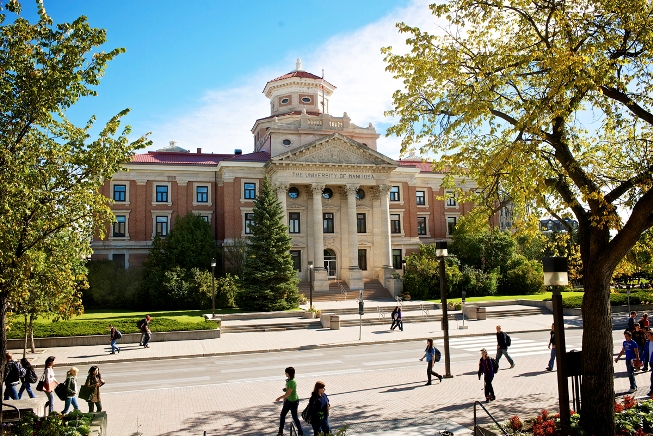Total undergraduates
2,000
International tuition fee
$24,000
School address
25 CHANCELLORS CIRCLE
Online or distance education
No
Number of graduate programs
50
Number of undergraduate programs
300
Number of graduate students
200
Number of undergraduate students
230
Quick facts about our school
The University of Manitoba Archives is a repository of historical records and rare materials that document the history and development of the university, as well as the broader community of Manitoba. The archives contain a diverse range of materials, including official university records, personal papers of prominent individuals associated with the university, publications, photographs, and artifacts. These materials offer valuable insights into the academic, cultural, and social history of the university and the province.
The University of Manitoba Archives plays a crucial role in preserving and providing access to these materials for research, teaching, and public engagement. The archives staff work to organize, describe, and digitize the collections, making them available to students, researchers, and the general public. By serving as a resource for historical research and education, the University of Manitoba Archives contributes to the preservation and dissemination of the university's and Manitoba's rich heritage for future generations.
School highlights

Life at our school
Life at the University of Manitoba Archives is vibrant and dynamic. As a hub of historical preservation and research, the archive is a treasure trove of knowledge and discovery. Students, scholars, and community members alike flock to the archive to delve into its vast collections, which span a wide range of subjects and time periods. The archive serves as a space for exploration, learning, and collaboration, where individuals can uncover hidden gems and piece together the intricate threads of history.
In addition to its academic and research functions, the University of Manitoba Archives also plays a crucial role in engaging with the community. Through public programming, exhibitions, and outreach initiatives, the archive opens its doors to share its resources and expertise with a wider audience. Whether hosting workshops, lectures, or tours, the archive creates opportunities for individuals to connect with the past and gain a deeper understanding of their own heritage and identity. Life at the University of Manitoba Archives is not just about preserving history—it's about exploring, connecting, and celebrating the rich tapestry of human experience.
The University of Manitoba Archives is a valuable resource for researchers, students, and the general public interested in exploring the rich history of the university and the province of Manitoba. The archives house a diverse collection of materials, including university records, manuscripts, photographs, and rare books, offering a unique glimpse into the past. With a dedicated team of archivists and staff, the University of Manitoba Archives is committed to preserving and promoting the historical heritage of the institution and the surrounding community. It serves as a vital hub for learning, discovery, and engagement, making it an essential destination for anyone seeking to uncover the stories and achievements that have shaped the university's legacy.
The University of Manitoba Archives is committed to fostering a sustainable future through various initiatives and practices. From digitizing collections to reduce paper waste and carbon footprint to promoting responsible consumption and recycling, the Archives aim to minimize their environmental impact. Additionally, the Archives collaborate with researchers and educators to raise awareness about sustainability issues and advocate for positive change within the academic community. By prioritizing sustainability, the University of Manitoba Archives are taking proactive steps towards creating a more environmentally-conscious and socially responsible future for generations to come.
The Overview vision at University of Manitoba Archives is to be a leading resource for preserving and providing access to the history and heritage of the University of Manitoba and its community.
- Preserve and protect historical records related to the University of Manitoba
- Provide access to these records for research, education, and community engagement
- Promote awareness and understanding of the university's history and contributions to society
- Collaborate with internal and external partners to enhance the archives' collection and services
The University of Manitoba Archives, located in Winnipeg, Canada, offers a rich and immersive campus experience for students and researchers interested in delving into the history and heritage of the university and the surrounding community. With a vast collection of archival materials, including documents, photographs, maps, and artifacts, the Archives provide a unique opportunity for visitors to explore and engage with the past.
The Archives also offer a range of educational programs, workshops, and exhibitions that bring history to life and create a dynamic learning environment for visitors of all ages. Whether you're a student looking to conduct research for a project or a history buff interested in uncovering the stories of the past, the University of Manitoba Archives provides a valuable and enriching campus experience.
Programs offered at our schools
The University of Manitoba Archives offers a range of diverse and engaging programs for students at both the undergraduate and graduate levels. As a leading educational institution, the University of Manitoba Archives provides undergraduate students with numerous program options across a variety of disciplines, allowing them to pursue their academic interests and career goals. At the graduate level, students have the opportunity to further expand their knowledge and expertise through specialized programs tailored to their specific research interests.
Whether students are interested in pursuing a Bachelor's degree, a Master's degree, or a Doctorate, the University of Manitoba Archives provides a supportive and enriching academic environment to help students reach their full potential. From hands-on research opportunities to innovative coursework taught by renowned faculty members, the programs at the University of Manitoba Archives are designed to equip students with the skills and knowledge needed to succeed in their chosen field. By offering a wide range of programs and resources, the University of Manitoba Archives is committed to fostering a vibrant and inclusive learning community that inspires intellectual growth and academic excellence.
The University of Manitoba Archives is a valuable resource for those interested in exploring the history and heritage of the university and the broader Manitoba community. Admission to the University of Manitoba Archives is free for all visitors, making it a accessible and welcoming space for students, researchers, and the general public. Visitors can explore a wide range of archival materials, including rare books, manuscripts, photographs, and other historical documents that provide insight into the university's past and the development of Manitoba as a province. Researchers and students are encouraged to make use of the Archives' resources to support their academic and personal interests, while also contributing to the preservation and dissemination of Manitoba's rich cultural heritage.
The University of Manitoba offers a wide range of undergraduate programs to students seeking admission. Prospective students can apply through the university's online application portal, where they will be required to provide their academic transcripts, letters of recommendation, and a personal statement. The admission process at the University of Manitoba is competitive, with the university looking for students with strong academic backgrounds and a passion for learning.
Once applications are submitted, the university's admissions team reviews each application carefully to determine if the applicant meets the requirements for their chosen program. Successful applicants will receive an offer of admission from the university, outlining the next steps they need to take to secure their spot in the program. The University of Manitoba is committed to providing a supportive and inclusive learning environment for all students, and encourages applicants from diverse backgrounds to apply.
At the University of Manitoba, undergraduate admissions are highly competitive and selective. With a strong emphasis on academic excellence and diverse experiences, the university seeks to enroll students who demonstrate a high level of achievement and potential.
The admissions process at the University of Manitoba Archives begins with the submission of an online application, including transcripts, letters of recommendation, and a personal statement. The university looks for students who not only excel in their academics but also show a commitment to leadership, community service, and extracurricular involvement. The admissions committee carefully reviews each application to ensure that the incoming class is comprised of talented and motivated individuals who will contribute to the university's academic community.
The Graduate Admissions process at University of Manitoba involves several steps to ensure that qualified candidates are selected for advanced academic programs. Some key points related to the Graduate Admissions process at this institution include:
- Submission of a completed application form and all required documentation, such as transcripts, letters of recommendation, and a statement of purpose.
- Meeting minimum academic requirements, which may vary depending on the program applied for.
- Taking standardized tests if required, such as the GRE or GMAT.
- Demonstrating proficiency in English by submitting TOEFL or IELTS scores for international applicants.
- Review of applications by a committee made up of faculty members from the relevant department or program.
- Selection of candidates based on academic achievements, letters of recommendation, research experience, and other relevant factors.
- Communication of admission decisions to successful candidates, who will then be required to confirm their acceptance and submit any necessary fees or deposits.
Overall, the Graduate Admissions process at University of Manitoba is designed to identify candidates who have the potential to succeed in their chosen field of study and contribute positively to the academic community at the university.
The Admission Requirements at University of Manitoba Archives typically include a completed application form, official transcripts from any previously attended institutions, a statement of purpose outlining the applicant's academic and career goals, letters of recommendation, and a resume or CV. Additionally, some programs may require standardized test scores such as the GRE or GMAT.
It's important for prospective students to review the specific admission requirements for their intended program at the University of Manitoba Archives and ensure that they meet all criteria before submitting their application. The admissions process is competitive, so applicants should strive to showcase their academic achievements, relevant experience, and passion for the field of archival studies in their application materials.
The admission deadline at the University of Manitoba varies depending on the program and program level. It is important for prospective students to carefully review the specific deadlines for the program they are interested in applying to. Deadlines for undergraduate programs typically fall in early January for the fall intake, while deadlines for graduate programs may vary by department.
It is highly recommended to check the University of Manitoba's official website or contact the admissions office for the most up-to-date and accurate information regarding admission deadlines. Meeting the application deadline is crucial to ensure that your application is considered for the desired program.
The University of Manitoba Archives offers a variety of scholarships and financial aid opportunities to support students pursuing their studies in archival and information management. These scholarships are designed to recognize academic excellence, research potential, and leadership qualities in students, while also helping to alleviate the financial burden of higher education. Students can apply for scholarships based on merit, need, or a combination of both, to ensure that all deserving individuals have access to the necessary resources to succeed in their academic pursuits. The University of Manitoba Archives is committed to fostering a supportive and inclusive environment where students can thrive and excel in their studies.
-
International students
-
Canadian students
-
Provincial students
Notes for the international students
See scholarships and other financial award programs on our website Also, see employment opportunities available to our international students
Keep in mind that the above are just rough estimates; the actual tuition fees vary widely, depending on many factors For a better estimate for YOU, please contact us
Managing finances as a student at University of Manitoba would require careful planning and budgeting. Start by creating a monthly budget that outlines your income and expenses. This will help you track where your money is going and identify areas where you can cut back.
Consider opening a student bank account with minimal fees and features like online banking to easily manage your finances. Take advantage of student discounts and offers to save money on essentials like textbooks, meals, and transportation. It's also important to prioritize saving for emergencies and future expenses, such as tuition or study abroad programs.
Lastly, consider taking on part-time work or applying for scholarships and bursaries to supplement your income. Remember to regularly review and adjust your budget as needed to ensure you stay on track financially throughout your time at University of Manitoba.
Students at University of Manitoba can work both on-campus and off-campus to support their studies and gain valuable work experience. On-campus employment opportunities can include positions within the university such as research assistant, tutor, library assistant, or student ambassador. These positions often offer flexible schedules that can accommodate a student's class timetable. Working on-campus also allows students to build relationships with faculty and staff, and engage with the university community.
For off-campus employment, students can explore part-time jobs in retail, hospitality, tutoring, or internships related to their field of study. Many students choose to seek work off-campus to gain a broader range of experiences and skills, as well as to connect with professionals in their desired industry. The University of Manitoba's Career Services can assist students in finding off-campus employment opportunities and provide resources for resume building and interviews. Overall, balancing work and study can be a rewarding experience that can enhance a student's academic and professional development.
Where does the financial assistance come from? Universities, the federal, provincial and territorial governments, individual schools, some businesses and charitable foundations give out bursaries and scholarships. Amazingly enough, over 100,000 scholarships are awarded every year, with many millions of dollars of available funds still going unclaimed because no one applies. Whether you are Canadian or an International student, you can apply for Bursaries and Sponsorships for a range of undergraduate, graduate, doctoral and post-doctoral courses at a wide range of universities so why not check with your chosen school when you apply?
If you are looking for a scholarship or financial aid for your studies, there are literally hundreds of online sources, with both government funding and private funds available. What you don’t want to fall victim to is some sort of scam, which may ask you to pay for the service of applying for a scholarship or even asking you for some sort of deposit. Here are some useful tips if you want to avoid scamming altogether.1- Remember - no authorised and responsible institution will charge you anything for enquiring about financial aid, or for applying for funds. 2- Money up front/ Application Fee - Never send money up front for an application fee - if you are asked to do so, this is definitely a scam!.3- Loan Fees - When applying for a loan, if a company asks you for a loan fee before they will release the money to you, don't go through with it. Companies add fees to your loan balance and would never ask you to pay upfront.4- Guaranteed Scholarships - There is no such thing as a guaranteed scholarship and any company that says they will guarantee you one on payment of a fee will never get back to you. 5- Company/ Scholarship Names - If you see a scholarship service or company that is using words like 'official', 'national', 'government' or other governmental or official sounding names be careful. They are most probably trying to sound official to cover up the scam.6- Phishing schemes - It may be that you get an email, a phone call or an SMS message, asking you for details like your name, address, social security number etc, along with a link to an application form on a website. This is actually a “phishing site” designed to steal your information. In general, you should never give your personal details to anyone, unless you trust them implicitly!.7- Lottery-based scholarships - If you are asked to complete a survey in return for entry into a prize draw (the prize being a scholarship) be very careful. The company providing the scholarship is making money off the information you provide by selling it to third parties. Your chances of winning are very slim and are not based on merit.8- Ask yourself, 'Is it too good to be true?' Although you may want to believe that your dream has just come true, use your common sense and do some research on the organisation involved.9- In general, never pay money - Things like application fees and service fees will be free for legitimate scholarships and you will never be asked to pay money.10- Check them out - If you have a scholarship offer that is asking for money up front, contact them personally. Real companies will be transparent in their services, location etc while scammers will usually be hard to get hold of.Lastly, always make sure that you are applying to an authorised university and that you go through their official channels when you send your personal details. You can find a comprehensive list of secondary education institutions on UniRank
The financial aspects of studying at University of Manitoba can vary depending on factors such as program of study, residency status, and personal circumstances. Tuition costs typically differ for domestic and international students, with international students usually paying higher fees. Additionally, there are other expenses to consider such as accommodation, textbooks, and living costs.
To help students manage these costs, the University of Manitoba offers various financial aid options including scholarships, bursaries, grants, and loans. Students are encouraged to explore these opportunities and seek guidance from the university's financial aid office to ensure they are making informed decisions about their finances while studying at University of Manitoba. It is important for students to budget effectively and plan ahead to ensure a successful and financially stable academic journey.
The University of Manitoba offers entrance scholarships to incoming students who demonstrate exceptional academic achievement, leadership potential, and community involvement. These scholarships aim to attract top talent and support students in pursuing their education at the university. The entrance scholarships range in value and criteria, with some being awarded based on high school grades, extracurricular activities, and letters of recommendation. By providing financial assistance and recognition for outstanding students, the University of Manitoba aims to foster a diverse and talented student body that will contribute to the university community and beyond.
At the University of Manitoba, entrance scholarships are awarded to outstanding students who demonstrate exceptional academic achievement, leadership qualities, and a strong commitment to community service. These scholarships are typically merit-based and are designed to recognize and support students who have excelled in their high school academics and extracurricular activities. The entrance scholarships at the University of Manitoba Archives provide financial assistance to help cover the costs of tuition, books, and other educational expenses, enabling students to pursue their academic goals and excel in their chosen fields of study. By receiving an entrance scholarship, students are not only recognized for their achievements but also given the opportunity to further their education and contribute to their communities in meaningful ways.
At the University of Manitoba, merit scholarships are awarded to students based on their academic achievements and overall excellence. These scholarships aim to recognize and reward students who have demonstrated exceptional performance in their studies. The university offers a variety of merit scholarships to help support students in pursuing their education and achieving their academic goals.
In terms of average percentage, the University of Manitoba does not publicly release specific information on the average percentage of students who receive merit scholarships. However, the university does have rigorous academic standards, and students who excel in their studies have the opportunity to be considered for various merit-based awards. Students are encouraged to strive for academic excellence and actively pursue scholarship opportunities to support their education at the University of Manitoba.
At the University of Manitoba Archives, there are numerous scholarships donors who have generously contributed to supporting the academic pursuits of students. These scholarships play a crucial role in providing financial assistance to students, allowing them to focus on their studies and achieve their educational goals. The donors behind these scholarships come from various backgrounds and have a strong commitment to helping students succeed in their academic endeavors. Their contributions have a lasting impact on the recipients, empowering them to further their education and pursue their career aspirations.
Through the generosity of the scholarship donors at the University of Manitoba Archives, students have the opportunity to access quality education and expand their knowledge in their respective fields of study. These donors play a vital role in fostering academic excellence and creating a supportive learning environment for students. Their philanthropic gestures not only benefit the individual recipients but also contribute to the overall advancement of education and research at the university. The dedication and generosity of these scholarship donors serve as a source of inspiration and encouragement for students as they strive to reach their full potential and make a positive impact on society.
The scholarships at University of Manitoba Archives are designed to provide financial support and recognition for outstanding students who demonstrate academic excellence and a passion for archival studies. These scholarships are intended to help offset the cost of tuition and living expenses for students pursuing a career in archives and records management. By awarding scholarships, the University of Manitoba Archives aims to attract top talent, promote diversity, and further the advancement of knowledge and skills in the field of archival studies. Additionally, these scholarships serve as a way to honor and support the next generation of archivists who will preserve and protect our cultural heritage for future generations.
Scholarships at University of Manitoba Archives serve a crucial purpose in supporting students in their academic pursuits. These scholarships are designed to provide financial assistance to students who demonstrate academic excellence, financial need, or special talents. By awarding scholarships, the University of Manitoba Archives aims to promote education and remove financial barriers that may prevent deserving students from accessing higher education.
Furthermore, scholarships also play a role in recognizing and rewarding outstanding achievements. They help to motivate students to excel in their studies and encourage them to reach their full potential. Ultimately, scholarships at University of Manitoba Archives contribute to creating a more inclusive and equitable learning environment, by providing opportunities for students to pursue their academic goals and contribute to the university community.
The University of Manitoba Archives & Special Collections are located in the Elizabeth Dafoe Library at the University of Manitoba in Winnipeg, Manitoba, Canada. They can be reached by phone at 204-474-9986 or by email at archives@umanitoba.ca. The Archives hold a wide range of materials related to the history of the University of Manitoba, as well as collections pertaining to various aspects of Manitoba and Canadian history.
The University of Manitoba Archives & Special Collections are open to researchers and visitors during regular business hours, Monday to Friday. For more information on their collections, services, and access policies, you can visit their website at https://umanitoba.ca/libraries/units/archives/index.html. Additionally, they offer reference and research assistance to help individuals navigate their collections and access the information they need.





